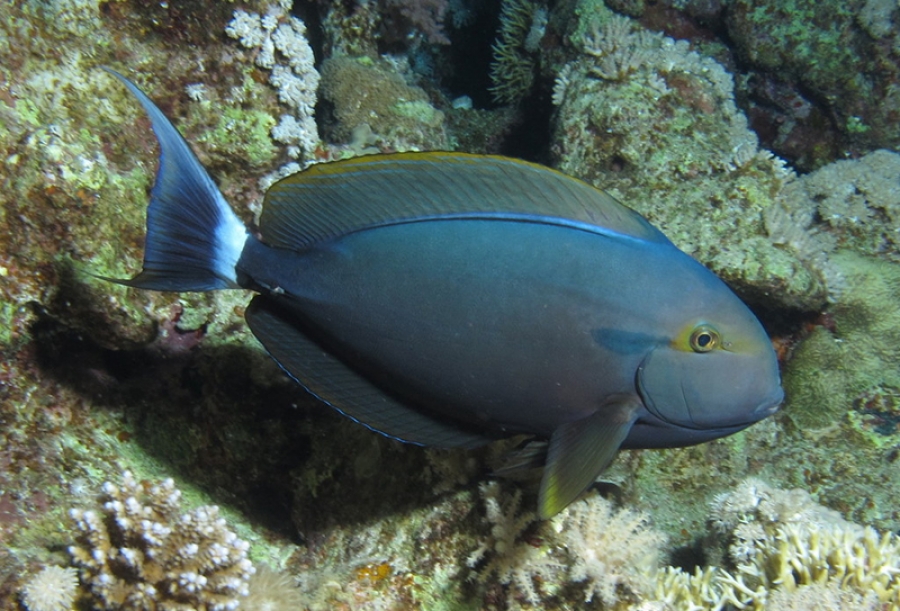Ciguatera poisoning cases reported: Williams
Saturday 4 January 2025 | Written by Talaia Mika | Published in Health, Local, National

The mato (Acanthurus gahhm, or black surgeonfish) is one of the species associated with ciguatera fish poisoning. 17111301
Secretary of Health Bob Williams confirmed that three cases of ciguatera poisoning had been recorded in recent weeks.
recorded in Rarotonga, “but not fully confirmed as fish poisoning”.
The confirmation came after The Rarotongan Beach Resort and Lagoonarium issued a public health advisory regarding an increase in reported cases of ciguatera poisoning following the consumption of fish caught in the lagoons surrounding the island.
Locals and visitors alike were warned of the dangers of eating reef fish caught within these lagoons, which may contain ciguatoxins – highly toxic substances that are harmful to humans but not to the fish themselves.
Ciguatera fish poisoning (CFP) is caused by ingesting fish that have accumulated ciguatoxin, a toxin that originates from microscopic marine algae.
These algae, Gambierdiscus toxicus, grow in and around coral reefs and are consumed by smaller fish, which are then eaten by larger fish such as grouper, trevally, and parrotfish.
Humans who consume these contaminated fish can experience a range of severe symptoms that affect the digestive, heart, and nervous systems.
The symptoms of ciguatera poisoning can range from gastrointestinal issues like diarrhoea, vomiting, and abdominal pain, to more serious neurological symptoms such as numbness, tingling, and “hot-cold reversal,” where hot items feel cold and vice versa.
In severe cases, the toxin can cause paralysis, coma, and even death.
“The best course of action is simply to avoid consuming any fish caught in the lagoons,” said the resort’s management, emphasising that fish from local supermarkets, both fresh and canned, are safe alternatives.
The Rarotongan Beach Resort and Lagoonarium has also reminded the public that fishing is strictly prohibited in the Aroa Lagoon Marine Sanctuary, which is located directly in front of the resort.
The lagoon is a protected area, or Rau’i, where the taking of any fish or marine life is forbidden to preserve the local ecosystem.
The Rarotongan Beach Resort and Lagoonarium also urged those planning fishing trips to consider venturing out to the open ocean, where fish are less likely to be contaminated with ciguatera.
The resort also cautioned pet owners not to feed reef fish to their animals, as the toxins in the fish can be fatal to cats, dogs, and other pets.















































Comments
graham roper on 07/01/2025
Along with other in-depth research it appears that ciguatera was not present until the 1980’s. It emerged after the introduction of cruise ships bring tourists to the Islands (Rarotonga). A ‘man made’ problem that can’t be reversed built on greed. Seabed mining fits into the same ‘man made’ problems based on greed that cannot be reversed. The destruction of the fishing stocks by greed driven ‘quotas’ that are/have decimated the feed source for the larger fish (e.g tuna) at least can be reversed. Can anyone provide details, evidence of what happens to all the money paid to the government and its officials from this type of sell off? Why does the Government need to borrow millions more when millions received from other governments, tourist taxes, quotas appear to be misdirected. TMO for example continues to fail the people and unable to to detail , for example , the $1.4 million gifted by Japan where it actually went. Where did the $1.7 million spent on 23 ( plus the one the minister of health already had) new Government cars (Nov 23) actually come from? Cook Island passport insistence by the PM along with reduced parliament sitting days smacks of a Government with lots to hide. Why is no one prepared to join the dots to protect from what appears from the growing evidence that’s supports the previously reported “Cook Islands most corrupt Pacific Pacific Islands and or “ Money laundering capital of the Pacific?.?” (UN report,TIKH 2022, IC&ML index))